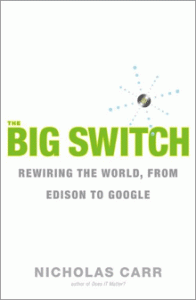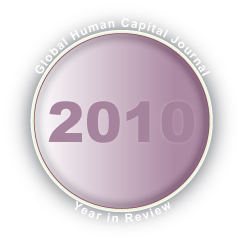 Social Business: How Firm Size Affects Strategy and Execution outlines differences firm size presents in social business initiatives. I recently participated in a discussion in which we debated how size of brand or firm should affect social business strategy, so I’ll dive deeper into the issues here because they are an excellent opportunity to show how strategy and execution are connected and how they differ. I’ll compare how startups and enterprises approach four areas of executing a social business initiative: team, collaboration, learning and scaling. Social Business: How Firm Size Affects Strategy and Execution outlines differences firm size presents in social business initiatives. I recently participated in a discussion in which we debated how size of brand or firm should affect social business strategy, so I’ll dive deeper into the issues here because they are an excellent opportunity to show how strategy and execution are connected and how they differ. I’ll compare how startups and enterprises approach four areas of executing a social business initiative: team, collaboration, learning and scaling.
[…]
 As a speaker at the CIO Forum & Executive IT Summit this past week, I spent two days in focused conversations with enterprise CIOs. The summit is co-sponsored by SIM, TEN and ITEEX and is a relatively intimate setting as most attendees are CIOs, and no press is allowed. We spoke about what was top of mind for CIOs and their experiences with social business. It served as an excellent “current state of the CIO,” and I have some surprising takeaways to share. I’ll also offer a surprising prediction and social business guidance to CIOs. As a speaker at the CIO Forum & Executive IT Summit this past week, I spent two days in focused conversations with enterprise CIOs. The summit is co-sponsored by SIM, TEN and ITEEX and is a relatively intimate setting as most attendees are CIOs, and no press is allowed. We spoke about what was top of mind for CIOs and their experiences with social business. It served as an excellent “current state of the CIO,” and I have some surprising takeaways to share. I’ll also offer a surprising prediction and social business guidance to CIOs.
Having advised CEOs, CIOs, COOs and CMOs on adopting disruptive technology at various stages of my career, I have a broad perspective of the enterprise and executive roles. From the mid 1990s through 2006, I focused on enterprise software and corporate strategy. In 2006, I launched CSRA to advise enterprises on social business strategy, and I’ve been working with CMOs, which has been personally rewarding as I have also led marketing several times in my career. For context, here are a few things that most executives don’t yet […]
How Social Actions Have Pulled the Rug from under Banner Ads
 Facebook’s development schedule epitomizes the “white water, fast iteration” approach to serving company and customer. Although its mishaps are legendary, it succeeds in consistently fielding a mind-numbing array of features, so it is difficult to keep up and very easy to miss the significance of things. To whit, very few people people have noticed that Facebook has quietly revolutionized banner ads through a feature that is maligned by users but gold for marketers. This feature has created two opportunities for e-commerce marketers: a new means of inexpensive market research and an easy way to improve relationships with their viewers. Read on to do this to your competitors before they do it to you. Facebook’s development schedule epitomizes the “white water, fast iteration” approach to serving company and customer. Although its mishaps are legendary, it succeeds in consistently fielding a mind-numbing array of features, so it is difficult to keep up and very easy to miss the significance of things. To whit, very few people people have noticed that Facebook has quietly revolutionized banner ads through a feature that is maligned by users but gold for marketers. This feature has created two opportunities for e-commerce marketers: a new means of inexpensive market research and an easy way to improve relationships with their viewers. Read on to do this to your competitors before they do it to you.
[…]
Review: South by Southwest Interactive 2011 takes you behind the curtain of the famous confab and suggests why you might want to attend
 I had never attended SXSW before because I always had other things happening, and the value proposition was never obvious to me. In general, I attend very few “social media” conferences as the hype usually exceeds the delivery in an “industry” that’s particularly prone to self-congratulation. This year, a client launched a new venture at SXSW, so I decided to stay a couple of days afterward to see what the noise was about. Here are my informal impressions that I hope will be useful to you in deciding whether it might be worthwhile for you to attend. I invite your comments and impressions, too. I had never attended SXSW before because I always had other things happening, and the value proposition was never obvious to me. In general, I attend very few “social media” conferences as the hype usually exceeds the delivery in an “industry” that’s particularly prone to self-congratulation. This year, a client launched a new venture at SXSW, so I decided to stay a couple of days afterward to see what the noise was about. Here are my informal impressions that I hope will be useful to you in deciding whether it might be worthwhile for you to attend. I invite your comments and impressions, too.
[Update: links to additional coverage below: Gowalla, TOMS, LinkedIn execs]
[…]
Curmudgeonly Looking into the Past to Divine the Future—That Nagging Privacy Issue—Debunking the Elephant
 The Big Switch is a valuable book that reflects what has become Nick Carr’s trademark role, heckling IT and Web enthusiasts, albeit from good seats. Carr seems to relish his role as “the fly in the ointment” of the idealistic IT-enabled world that Web missionaries espouse. Although this book has shortcomings, I recommend it for two reasons. First, Carr makes a convincing and useful argument that the “electrification” of business and society (the Edison part) has valuable lessons for the “computerization” transformation of business and society (the Google part) that is currently unfolding. This parallel provides context to think about some of the disruptions around your business, society and career. Second, Carr raises serious questions about possible privacy implications of computerization. He palpably weighs in on the dark side and seems to want the world to change course from the “googlization of life.” If you haven’t read The Long Tail, I would read these books in proximity because they are very complementary and both quick, important reads. The Big Switch is a valuable book that reflects what has become Nick Carr’s trademark role, heckling IT and Web enthusiasts, albeit from good seats. Carr seems to relish his role as “the fly in the ointment” of the idealistic IT-enabled world that Web missionaries espouse. Although this book has shortcomings, I recommend it for two reasons. First, Carr makes a convincing and useful argument that the “electrification” of business and society (the Edison part) has valuable lessons for the “computerization” transformation of business and society (the Google part) that is currently unfolding. This parallel provides context to think about some of the disruptions around your business, society and career. Second, Carr raises serious questions about possible privacy implications of computerization. He palpably weighs in on the dark side and seems to want the world to change course from the “googlization of life.” If you haven’t read The Long Tail, I would read these books in proximity because they are very complementary and both quick, important reads.
As […]
 2011 Social Business Predictions and Recommendations describes current social business adoption and advices firms and people how to get ahead. 2011 Social Business Predictions and Recommendations describes current social business adoption and advices firms and people how to get ahead.
2011 will be remembered as the year “social media” fell by the wayside, strategy became a recognized prerequisite for serious efforts, and “social business” began displacing it in boardrooms’ mindshare. “Social media,” which usually tries to use social technologies to talk at people, has been the predominant “first use” of socialtech because marketing drives most social initiatives, and marketers “communicate,” i.e. push content, to their targets. When they “listen,” they use limited legacy processes such as focus groups, email marketing, data mining and online surveys. However, none of these scratch the real itch because they emphasize the company asking individuals structured questions; they don’t allow customer to customer interaction, which is ten times more illuminating because it is spontaneous and customer-centric.
Socialtech gets there, but marketers are ambivalent about it because it means a loss of control. And more profits and career growth for marketers, but they have to let go first. It’s a leap of faith, but […]
Web 3.0 and Social Business—2011 Predictions and Recommendations describes a turning point, away from social media to social business. SocialTech Grows Up—Relationship the Foundation of Business Success—Digital Clodhoppers Become Sore Thumbs.
 2011 will mark a turning point in the adoption of digital social technologies because the experimentation phase is drawing to a close, and stakeholder expectations are increasing. Organizations and people will no longer gain attention by executing badly. At the enterprise level, participation will wane in venues and initiatives that have no business strategy, focus, content strategy and commitment. Paying inexperienced people or agencies to “share” snappy content will expose brands as digital clodhoppers and push customers away. Individuals will also have to improve their game and focus on the most relevant people in their networks. Stop sending default invitations on LinkedIn. Proactively support people whom you respect and trust the most. The theme is determining and executing on strategy, focus and commitment. 2011 will mark a turning point in the adoption of digital social technologies because the experimentation phase is drawing to a close, and stakeholder expectations are increasing. Organizations and people will no longer gain attention by executing badly. At the enterprise level, participation will wane in venues and initiatives that have no business strategy, focus, content strategy and commitment. Paying inexperienced people or agencies to “share” snappy content will expose brands as digital clodhoppers and push customers away. Individuals will also have to improve their game and focus on the most relevant people in their networks. Stop sending default invitations on LinkedIn. Proactively support people whom you respect and trust the most. The theme is determining and executing on strategy, focus and commitment.
In 2011, the bar to attract and hold attention will be higher, which will present organizations with a new threat: when participation falls, some executives will conclude that […]
2010 Year In Review Initial Glimmers of Social Business is the Editor’s Choice of the Global Human Capital Journal—The Best Strategy, Tactics, Case Studies and Insights of 2010
 Compared to its progenitors 2009 and 2008, 2010 was a relatively calm year because the amplitude of market gyrations was clearly less, and businesses began to find a new floor on which to build stakeholder expectations. Although I watched with high interest the unfolding drama in Europe, I didn’t have the time to conduct the research necessary to do a rigorous interpretation. I did publish a reflection in January, which is not included in this year in review. However, 2010 marked a major turning point in the adoption of social technologies: the recognition that analysis and strategy were necessary to achieve consistent results with social initiatives. Compared to its progenitors 2009 and 2008, 2010 was a relatively calm year because the amplitude of market gyrations was clearly less, and businesses began to find a new floor on which to build stakeholder expectations. Although I watched with high interest the unfolding drama in Europe, I didn’t have the time to conduct the research necessary to do a rigorous interpretation. I did publish a reflection in January, which is not included in this year in review. However, 2010 marked a major turning point in the adoption of social technologies: the recognition that analysis and strategy were necessary to achieve consistent results with social initiatives.
2010 Macro trends
Social has been in adolescence up through 2009-2010 in which “being on Facebook” was an end in itself, agencies produced vapid content and little interaction happened because people won’t interact when brands are talking at them and not listening. People feel it when a […]
At first, it seemed that the machine had tilted, its levers, bells and flippers having hit some kind of glitch, causing us to lose the ball and the bonus points.
 As the curtain rises on the second decade of the twenty-first century, we will see that the machine is actually fine, but it’s become a different game. Quite entirely. To put it mildly, “the economy” is proving to be quite a drama, its pungence largely dependent on where your company or career is wired into it. Although it is quite frowned upon in the U.S. to admit despair, some pundits have even flirted with the moniker, “The Great Recession” to describe the crisis, a faint nod to the Great Depression of the 1930s, but this comparison is off-base. As I have argued for some time, the 2007-2010 “financial crisis” has played a mere overture to the real story, a transformation of the global “economic architecture.” I first heard this deft phrase from His Excellency Shri Kamal Nath, India’s very diplomatic Minister of Commerce in 2008 (coverage here). As the curtain rises on the second decade of the twenty-first century, we will see that the machine is actually fine, but it’s become a different game. Quite entirely. To put it mildly, “the economy” is proving to be quite a drama, its pungence largely dependent on where your company or career is wired into it. Although it is quite frowned upon in the U.S. to admit despair, some pundits have even flirted with the moniker, “The Great Recession” to describe the crisis, a faint nod to the Great Depression of the 1930s, but this comparison is off-base. As I have argued for some time, the 2007-2010 “financial crisis” has played a mere overture to the real story, a transformation of the global “economic architecture.” I first heard this deft phrase from His Excellency Shri Kamal Nath, India’s very diplomatic Minister of Commerce in 2008 (coverage here).
[…]
 Social Business Engagement Summit Keynote Disruption Theme—Don Peppers keynoted the second day of Alterian’s 2010 User Conference, Engaging Times Summit with a talk entitled, “Death by word of Mouth.” Encouraging ,^) Social Business Engagement Summit Keynote Disruption Theme—Don Peppers keynoted the second day of Alterian’s 2010 User Conference, Engaging Times Summit with a talk entitled, “Death by word of Mouth.” Encouraging ,^)
Technology and interactivity are now. 96% of Gen Y are members of social networks. They are self-oriented and have no trust in adverts. He cited the film Bruno, which people panned in social networks and Twitter on its opening day; the box office fell 40% the next day (and never recovered). Before Web 2.0, the studio could have built momentum through adverts. No more. You can’t ungoogle yourself. […]
|
|
 Social Business: How Firm Size Affects Strategy and Execution outlines differences firm size presents in social business initiatives. I recently participated in a discussion in which we debated how size of brand or firm should affect social business strategy, so I’ll dive deeper into the issues here because they are an excellent opportunity to show how strategy and execution are connected and how they differ. I’ll compare how startups and enterprises approach four areas of executing a social business initiative: team, collaboration, learning and scaling.
Social Business: How Firm Size Affects Strategy and Execution outlines differences firm size presents in social business initiatives. I recently participated in a discussion in which we debated how size of brand or firm should affect social business strategy, so I’ll dive deeper into the issues here because they are an excellent opportunity to show how strategy and execution are connected and how they differ. I’ll compare how startups and enterprises approach four areas of executing a social business initiative: team, collaboration, learning and scaling.
 As a speaker at the CIO Forum & Executive IT Summit this past week, I spent two days in focused conversations with enterprise CIOs. The summit is co-sponsored by SIM, TEN and ITEEX and is a relatively intimate setting as most attendees are CIOs, and no press is allowed. We spoke about what was top of mind for CIOs and their experiences with social business. It served as an excellent “current state of the CIO,” and I have some surprising takeaways to share. I’ll also offer a surprising prediction and social business guidance to CIOs.
As a speaker at the CIO Forum & Executive IT Summit this past week, I spent two days in focused conversations with enterprise CIOs. The summit is co-sponsored by SIM, TEN and ITEEX and is a relatively intimate setting as most attendees are CIOs, and no press is allowed. We spoke about what was top of mind for CIOs and their experiences with social business. It served as an excellent “current state of the CIO,” and I have some surprising takeaways to share. I’ll also offer a surprising prediction and social business guidance to CIOs. I had never attended SXSW before because I always had other things happening, and the value proposition was never obvious to me. In general, I attend very few “social media” conferences as the hype usually exceeds the delivery in an “industry” that’s particularly prone to self-congratulation. This year, a client launched a new venture at SXSW, so I decided to stay a couple of days afterward to see what the noise was about. Here are my informal impressions that I hope will be useful to you in deciding whether it might be worthwhile for you to attend. I invite your comments and impressions, too.
I had never attended SXSW before because I always had other things happening, and the value proposition was never obvious to me. In general, I attend very few “social media” conferences as the hype usually exceeds the delivery in an “industry” that’s particularly prone to self-congratulation. This year, a client launched a new venture at SXSW, so I decided to stay a couple of days afterward to see what the noise was about. Here are my informal impressions that I hope will be useful to you in deciding whether it might be worthwhile for you to attend. I invite your comments and impressions, too. The Big Switch is a valuable book that reflects what has become Nick Carr’s trademark role, heckling IT and Web enthusiasts, albeit from good seats. Carr seems to relish his role as “the fly in the ointment” of the idealistic IT-enabled world that Web missionaries espouse. Although this book has shortcomings, I recommend it for two reasons. First, Carr makes a convincing and useful argument that the “electrification” of business and society (the Edison part) has valuable lessons for the “computerization” transformation of business and society (the Google part) that is currently unfolding. This parallel provides context to think about some of the disruptions around your business, society and career. Second, Carr raises serious questions about possible privacy implications of computerization. He palpably weighs in on the dark side and seems to want the world to change course from the “googlization of life.” If you haven’t read The Long Tail, I would read these books in proximity because they are very complementary and both quick, important reads.
The Big Switch is a valuable book that reflects what has become Nick Carr’s trademark role, heckling IT and Web enthusiasts, albeit from good seats. Carr seems to relish his role as “the fly in the ointment” of the idealistic IT-enabled world that Web missionaries espouse. Although this book has shortcomings, I recommend it for two reasons. First, Carr makes a convincing and useful argument that the “electrification” of business and society (the Edison part) has valuable lessons for the “computerization” transformation of business and society (the Google part) that is currently unfolding. This parallel provides context to think about some of the disruptions around your business, society and career. Second, Carr raises serious questions about possible privacy implications of computerization. He palpably weighs in on the dark side and seems to want the world to change course from the “googlization of life.” If you haven’t read The Long Tail, I would read these books in proximity because they are very complementary and both quick, important reads. 2011 Social Business Predictions and Recommendations describes current social business adoption and advices firms and people how to get ahead.
2011 Social Business Predictions and Recommendations describes current social business adoption and advices firms and people how to get ahead. Compared to its progenitors 2009 and 2008, 2010 was a relatively calm year because the amplitude of market gyrations was clearly less, and businesses began to find a new floor on which to build stakeholder expectations. Although I watched with high interest the unfolding drama in Europe, I didn’t have the time to conduct the research necessary to do a rigorous interpretation. I did publish a reflection in January, which is not included in this year in review. However, 2010 marked a major turning point in the adoption of social technologies: the recognition that analysis and strategy were necessary to achieve consistent results with social initiatives.
Compared to its progenitors 2009 and 2008, 2010 was a relatively calm year because the amplitude of market gyrations was clearly less, and businesses began to find a new floor on which to build stakeholder expectations. Although I watched with high interest the unfolding drama in Europe, I didn’t have the time to conduct the research necessary to do a rigorous interpretation. I did publish a reflection in January, which is not included in this year in review. However, 2010 marked a major turning point in the adoption of social technologies: the recognition that analysis and strategy were necessary to achieve consistent results with social initiatives. As the curtain rises on the second decade of the twenty-first century, we will see that the machine is actually fine, but it’s become a different game. Quite entirely. To put it mildly, “the economy” is proving to be quite a drama, its pungence largely dependent on where your company or career is wired into it. Although it is quite frowned upon in the U.S. to admit despair, some pundits have even flirted with the moniker, “The Great Recession” to describe the crisis, a faint nod to the Great Depression of the 1930s, but this comparison is off-base. As I have argued for some time, the 2007-2010 “financial crisis” has played a mere overture to the real story, a transformation of the global “economic architecture.” I first heard this deft phrase from His Excellency Shri Kamal Nath, India’s very diplomatic Minister of Commerce in 2008 (coverage here).
As the curtain rises on the second decade of the twenty-first century, we will see that the machine is actually fine, but it’s become a different game. Quite entirely. To put it mildly, “the economy” is proving to be quite a drama, its pungence largely dependent on where your company or career is wired into it. Although it is quite frowned upon in the U.S. to admit despair, some pundits have even flirted with the moniker, “The Great Recession” to describe the crisis, a faint nod to the Great Depression of the 1930s, but this comparison is off-base. As I have argued for some time, the 2007-2010 “financial crisis” has played a mere overture to the real story, a transformation of the global “economic architecture.” I first heard this deft phrase from His Excellency Shri Kamal Nath, India’s very diplomatic Minister of Commerce in 2008 (coverage here). Social Business Engagement Summit Keynote Disruption Theme—Don Peppers keynoted the second day of Alterian’s 2010 User Conference, Engaging Times Summit with a talk entitled, “Death by word of Mouth.” Encouraging ,^)
Social Business Engagement Summit Keynote Disruption Theme—Don Peppers keynoted the second day of Alterian’s 2010 User Conference, Engaging Times Summit with a talk entitled, “Death by word of Mouth.” Encouraging ,^)